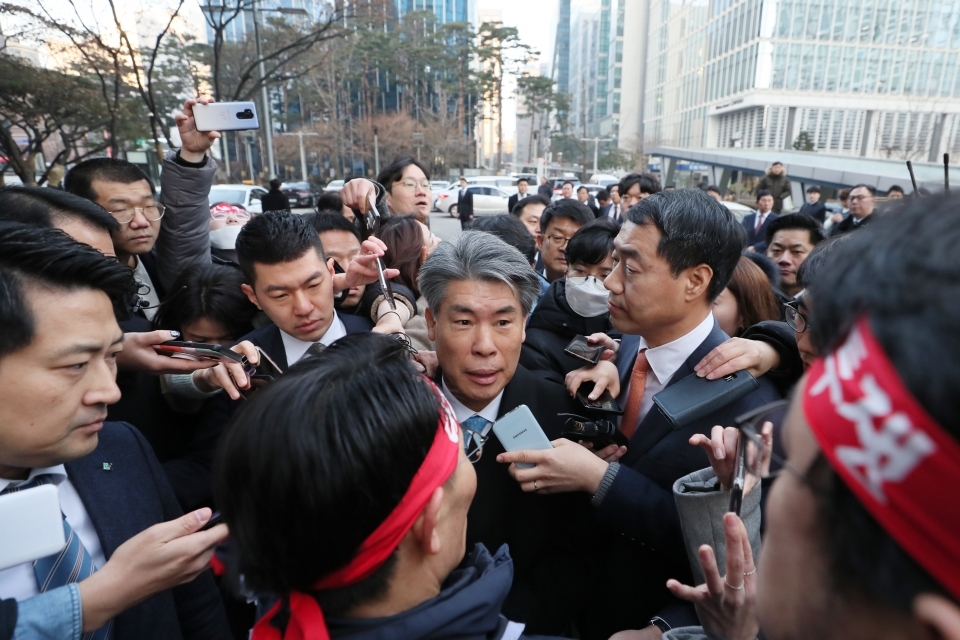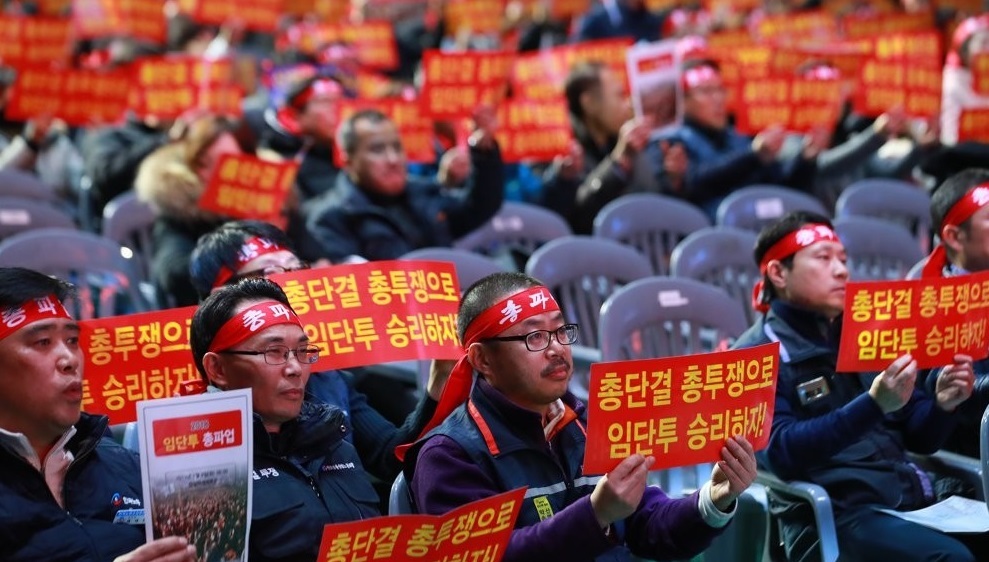[Feature] Amid market transition, Korea’s bank unions want bigger role, power
Spurred by IBK case, unions seek representation on board, more leverage
By Jung Min-kyungPublished : March 3, 2020 - 14:49

The new chief executive officer of state-run Industrial Bank of Korea was unable to enter his office for nearly a month, and there was an obvious reason.
Facing agitating unionized workers in January, IBK CEO Yoon Jong-won turned back, without a word, and headed home every morning.
But the doors opened at the end of the month, after Yoon agreed to three key concessions, including the provision that labor would be allowed to recommend a board member.
The 27-day protest, when workers blocked the path of a CEO appointed by President Moon Jae-in, was a strong stand against excessive government meddling in the organization’s personnel affairs, the union said. Yet the protest -- and the growing power of unionized workers in the banking sector -- drew a mixed response as bankers are widely seen as elites, not blue-collar workers.
Like the IBK, other labor unions of major lenders -- KB Kookmin, Hana, Woori and Shinhan -- are all members of Korean Financial Industry Union, an umbrella organization with a membership of 37 labor units associated with private and public financial institutions and around 100,000 employees in the industry.
Its mission has remained the same for decades, since its establishment in 1960: to elevate the workers’ status in the industry. But today it appears to be facing a bigger threat: the diminishing role of rank-and-file bankers in the era of digitalization of the capital market.
“In the financial sector, the foray of fintech firms and change in the processing and transaction system has changed the role of employees,” said Lee Jeong-hee, a research fellow at the state-run Korea Labor Institute.
“It is crucial for employers not to force adaption of new technology on their employees, but to allow time for adjustment and perhaps negotiate new labor hours suitable under the current circumstances,” she added.
Given the changing market circumstances, the KFIU is taking a new approach, with a new goal of implementing a 35-hour workweek at commercial banks and expanding workers’ participation in management through governance reform.
Behind the move is the KFIU’s new head Park Hong-bae, who is also chief of KB Kookmin Bank’s labor union and is considered a hard-liner.
“Our common goal always has been to elevate the status of workers in the financial sector through wage and welfare negotiations,” said Park.
Into the boardroom
As seen in IBK’s case, the issue of worker representation on corporate boards appears to be gaining strength among banking unions.
Yoon’s promise to allow workers to “recommend” a board member is seen as a precursor to actual employee representation on corporate boards, since the current agreement does not guarantee voting rights to the unionists. Nevertheless, it has become a thorny issue for many.

KB Financial Group’s union was the first to depart from the starting line, bolstered by President Moon’s campaign pledge to adopt a corporate structure where workers have greater representation. The banking group was the first to list worker representation as an agenda item at two shareholders meetings -- first in November 2017 and again in March 2018 -- but the idea was voted down. It drew strong opposition from foreign shareholders, who held a combined 70 percent stake in the holding group.
The state-run Export-Import Bank of Korea then recommended a candidate for an external board position in January, but the Ministry of Economy and Finance refused. The ministry has the final authority over the selection of board members.
But some industry watchers believe IBK may eventually be the first in the industry to adopt the new model due to its nature as a state-run lender. Its external board members are confirmed by the policymaking Financial Supervisory Service, not by shareholders.
“Korean businesses lack intra-company powers that can question employers’ dogmatic decisions,” said Lee Tae-yong, director of the IBK’s labor union.
“The US industries are largely based on shareholder capitalism, while Europe is focused on stakeholder management and related officials. That gives ground for the involvement of labor representatives on corporate boards. Korea has yet to establish a system such as either (the US or Europe),” he added.
FSC Chairman Eun Sung-soo is taking a cautious approach to the matter, telling reporters in January that the practice “will not be immediately adopted” but he would carefully consider it “in time.”
Eun’s attitude, though not affirmative, is a noticeable shift from his predecessor’s approach toward the issue. The agency’s previous chairman, Choi Jong-ku, had firmly denied the unionists’ request, saying that “compared with other sectors, the financial sector is neither poor or financially disadvantaged enough to adopt worker representation on the board.”
Some say fighting for worker representation in boardrooms would be “unthinkable” in other industries, which are dominated by family-run conglomerates. Labor protests in chaebol have been aggressive as they often target the owner family and its weaknesses to gain leverage in negotiations.
Korea’s banks, by nature, have no ties to chaebol, meaning there is no line of succession for leadership roles and the chiefs are in power for a limited time, depending on cooperation from the union, according to a market watcher who did not wish to be identified. “The heads of financial groups may feel under pressure as a result of (resistance from labor), and they want to keep their relationship smooth through their executive terms.”
Despite the growing calls for worker representation inside bank unions, it is unlikely that it will become a public issue.
A full-scale strike is extremely rare in Korea’s financial sector, where the average salary is higher compared with other industries. Like unions in most big corporations, bank unions are often derided as “aristocratic,” and their perceived focus is on securing generous conditions for older workers at the expense of younger employees.
Despite a slew of criticism, many bank employees believe the union represents the stance of the majority in the sector, where the work culture is considered “conservative, hierarchical and rigid,” thus creating a stressful environment for its employees.
“Top officials at every branch across the nation are union members,” an official at KB Kookmin Bank said, requesting anonymity.
‘The unions in the banking sector are strong compared to other industries, including the IT sector, because despite the wave of digitalization, it still requires employees to operate the system,” the official added.
By Jung Min-kyung (mkjung@heraldcorp.com)







![[KH Explains] Hyundai's full hybrid edge to pay off amid slow transition to pure EVs](http://res.heraldm.com/phpwas/restmb_idxmake.php?idx=644&simg=/content/image/2024/04/18/20240418050645_0.jpg&u=20240419100350)







![[From the Scene] Monks, Buddhists hail return of remains of Buddhas](http://res.heraldm.com/phpwas/restmb_idxmake.php?idx=652&simg=/content/image/2024/04/19/20240419050617_0.jpg&u=20240419175937)

![[KH Explains] Hyundai's full hybrid edge to pay off amid slow transition to pure EVs](http://res.heraldm.com/phpwas/restmb_idxmake.php?idx=652&simg=/content/image/2024/04/18/20240418050645_0.jpg&u=20240419100350)

![[Today’s K-pop] Illit drops debut single remix](http://res.heraldm.com/phpwas/restmb_idxmake.php?idx=642&simg=/content/image/2024/04/19/20240419050612_0.jpg&u=)